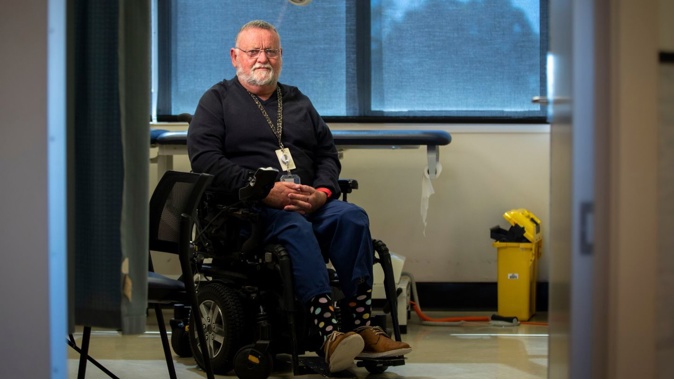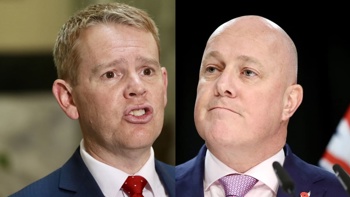
Plastic surgeon Dr Cary Mellow is fazed by very little.
The long-serving Middlemore surgeon once had his face bashed in with a hammer by a disgruntled patient.
He has completed some of the most complex surgeries in this country - reattaching a child’s lips after a dog bite, and rejoining an arm sawn off in an industrial accident.
And he has now had both of his own legs removed below the knee because of complications related to historic injuries.
It has barely slowed him down or even raised his pulse.
“There’s no point in giving up,” he told the Herald on Sunday from his consulting room at Middlemore Hospital. He is sitting in his wheelchair with polka-dot socks pulled over his prosthetic legs and an iPhone in his hand. He sometimes uses the iPhone light to inspect patients.
“I guess I’ve had a number of challenges,” he concedes. “They have influenced what I do but they have not stopped me from doing many things I love to do both at work and in my personal life.
“They’ve caused me to redesign my life and make modifications so I can continue.”
Mellow, 66, has worked at Middlemore on-and-off since 1978, firstly as a medical school student working on Friday and Saturday nights in the emergency department, doing skin operations under the watchful eye of more senior doctors.
After a stint overseas, he worked at Middlemore as a consulting surgeon in the 1990s and early 2000s. In that time he became one of New Zealand’s leading plastic surgeons.
In 1998, he famously re-attached a 2-year-old boy’s lip after the child was bitten by a dog. It involved reattaching blood vessels that were just 0.3mm wide.
After the surgery, there was no vein to drain the blood so the boy, Samuel Martin, had black leeches placed near the wound to suck away blood for five days. At the time, it was one of only 10 documented cases around the world of lips being “replanted”.
Asked about it now, Dr Mellow downplays its significance, saying surgeons had been replanting severed parts of the body since the 1970s: “It’s really nothing new”.
Dr Mellow now works two days a week at Middlemore Hospital. Although he rarely does operations, he says he "puts the gloves back on" occasionally. Photograph / Michael Craig
It was another case the same year that led to his appearing in the lead story of the 6pm news.
Mellow had corrected a male patient’s large, crooked nose and after a couple of months, the patient was unhappy with it.
After a number of appointments to address his concerns, the patient turned up to an appointment with a briefcase. Partway through the consultation he pulled out a hammer and “walloped” Mellow, breaking his nose and cheekbone. His colleagues came back to work at Middlemore that night and put his face back together.
In 2003, Mellow quit the hospital, saying he could not tolerate the lack of funding in public health. It was at a time when his colleagues were also speaking out about bed reductions and it gained him national attention.
He moved into private practice, which he is quick to say was not a financial decision and was not solely cosmetic surgery, with many patients needing skin cancer removals or breast reconstructions. He also started a music theory degree at the University of Auckland but had to give it up partway when his wife became sick. She died in 2011.
Mellow had left Middlemore reluctantly and when they asked him back in 2015 on a part-time basis he jumped at the chance.
“I enjoy private practice,” he said. “But certainly I missed the fact that you can look after people who can’t afford to have surgery done.”
During this time, his own personal health problems began adding up. He had been on crutches for years after he had suffered a heart attack following back surgery, which hampered his rehabilitation.
In 2018, he fell down a flight of stairs and injured his right foot. Eventually, an infection in the heel bone became too severe and his right leg was amputated. Unable to stand, he closed his private practice in Remuera.
Middlemore still wanted him, and he returned to work two days a week. He had often done surgery sitting down, so his new wheelchair was not a hindrance.
Mellow, a Royal Australasian College of Surgeons Fellow, is now employed in the Manchester suite, where an expanded plastic surgery department has a “see and treat” approach. That means patients needing minor surgeries under local anaesthetic are often able to get an operation at their first appointment, or within a few weeks.
On the day the Herald on Sunday visited, Mellow had seen 15 patients and six had been booked for surgery, mostly skin cancers or grafts which take an hour or two. The gap between diagnosis by a GP to surgery at Middlemore is usually about a month.
At a time when public hospitals are plagued with long waitlists for elective surgery and staff shortages, it is a quiet success story - and a contrast to the frustrating working conditions that Mellow left two decades ago.
He no longer does the operations himself, but consults with patients, decides whether they need surgery, plans the surgery and sometimes supervises the registrars. He also teaches at the Medical School.
“It’s not the complete package,” he said. “But it’s most enjoyable just to use my knowledge. It’s nice to be able to still feel that you’re valuable and that you can give something back.”
Occasionally he “puts the gloves back on” and helps with an operation. When White Island erupted in 2019 and every plastic surgeon in Auckland was called in to treat patients with severe burns, he took over their smaller operations so they could focus on the more urgent work.
“I didn’t do much,” he insists.
Greater challenges were still to come. Two years ago, he injured his left ankle when transferring from his bed to his wheelchair. It became infected and eventually the lower leg was amputated last year.
After a short break following his second amputation, he went back to work.
“Again, Middlemore said, when you’re ready, come back.”
He had to give up fishing and sell his boat. But he has subscriptions to the Auckland Philharmonia Orchestra and the New Zealand Symphony Orchestra. One of the perks is a dedicated space for wheelchair users at the Auckland Town Hall with a free seat for a companion.
He catches the train to work - it is a short trip from his home in Remuera to the Newmarket Train Station, and the train stops at Middlemore’s doorstep. The hardest part of the day is showering and dressing and transferring to his chair before work. Once that’s done, life is “dead easy”, he said.
“Everything is pretty much the same. I see the patients, I examine them, tell them what the problem is and what we need to do.”
Take your Radio, Podcasts and Music with you

/cloudfront-ap-southeast-2.images.arcpublishing.com/nzme/W34R3JWEVRB2DDVTPTYUISXSWM.JPG)








